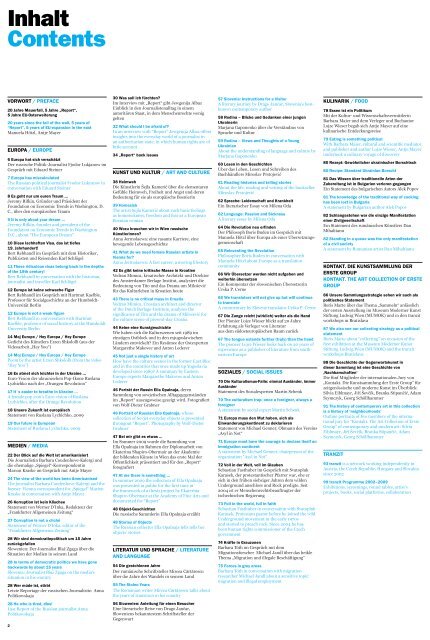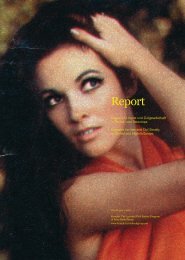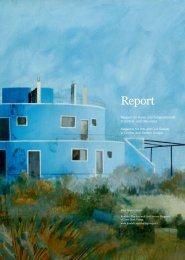Report_Issue 1/2009 - Jubiläum/ 20 Jahre Mauerfall
Report_Issue 1/2009 - Jubiläum/ 20 Jahre Mauerfall
Report_Issue 1/2009 - Jubiläum/ 20 Jahre Mauerfall
Sie wollen auch ein ePaper? Erhöhen Sie die Reichweite Ihrer Titel.
YUMPU macht aus Druck-PDFs automatisch weboptimierte ePaper, die Google liebt.
Inhalt<br />
Contents<br />
VORWORT / PREFACE<br />
<strong>20</strong> <strong>Jahre</strong> <strong>Mauerfall</strong>, 5 <strong>Jahre</strong> „<strong>Report</strong>“,<br />
5 <strong>Jahre</strong> EU-Ost erweiterung<br />
<strong>20</strong> years since the fall of the wall, 5 years of<br />
“<strong>Report</strong>”, 5 years of EU- expansion in the east<br />
Manuela Hötzl, Antje Mayer<br />
EUROPA / EUROPE<br />
6 Europa hat sich verschätzt<br />
Der russische Politik-Journalist Fjodor Lukjanow im<br />
Gespräch mit Eduard Steiner<br />
7 Europa has miscalculated<br />
The Russian political journalist Fyodor Lukyanov in<br />
conversation with Eduard Steiner<br />
8 Es geht nur um euren Traum ...<br />
Jeremy Rifkin, Gründer und Präsident der<br />
Foundation on Economic Trends in Washington, D.<br />
C., über den europäischen Traum<br />
9 It is only about your dream ...<br />
Jeremy Rifkin, founder and president of the<br />
Foundation on Economic Trends in Washington<br />
D.C., about “The European Dream”<br />
10 Diese lachhaften Visa, das ist tiefes<br />
19. Jahrhundert!<br />
Bert Rebhandl im Gespräch mit dem Historiker,<br />
Publizisten und Reisenden Karl Schlögel<br />
11 These ridiculous visas belong back in the depths<br />
of the 19th century!<br />
Bert Rebhandl in conversation with the historian,<br />
journalist and traveller Karl Schlögel<br />
12 Europa ist keine schwache Figur<br />
Bert Rebhandl im Gespräch mit Hartmut Kaelble,<br />
Professor für Sozialgeschichte an der Humboldt-<br />
Universität Berlin<br />
12 Europe is not a weak figure<br />
Bert Rebhandl in conversation with Hartmut<br />
Kaelble, professor of social histtory at the Humboldt<br />
University Berlin<br />
14 Moj Europe / Hey Europa / Hey Europe<br />
Gedicht des Künstlers Erzen Shkololli (aus der<br />
Videoarbeit „Hey You“)<br />
14 Moj Europe / Hey Europa / Hey Europe<br />
Poem by the artist Erzen Shkololli (from the video<br />
“Hey You”)<br />
16 Es atmet sich leichter in der Ukraine ...<br />
Euro-Vision der ukrainischen Pop-Ikone Ruslana<br />
Lyzhichko nach der „Orangen Revolution“<br />
17 It´s easier to breathe in Ukraine ...<br />
A female pop icon’s Euro-vision of Ruslana<br />
Lyzhichko, after the Orange Revolution<br />
18 Unsere Zukunft ist europäisch<br />
Statement von Ruslana Lyzhichko, <strong><strong>20</strong>09</strong><br />
19 Our future is European<br />
Statement of Ruslana Lyzhichko, <strong><strong>20</strong>09</strong><br />
MEDIEN / MEDIA<br />
22 Der Blick auf die Welt ist amerikanisiert<br />
Die Journalistin Barbara Coudenhove-Kalergi und<br />
die ehemalige „Spiegel“-Korrespondentin<br />
Marion Kraske im Gespräch mit Antje Mayer<br />
24 The view of the world has been Americanised<br />
The journalist Barbara Coudenhove-Kalergi and the<br />
former Vienna correspondent for „Spiegel“ Marion<br />
Kraske in conversation with Antje Mayer<br />
26 Korruption ist kein Klischee<br />
Statement von Werner D’Inka, Redakteur der<br />
„Frankfurter Allgemeinen Zeitung“<br />
27 Corruption is not a cliché<br />
Statement of Werner D’Inka, editor of the<br />
“Frankfurter Allgemeine Zeitung”<br />
28 Wir sind demokratiepolitisch um 15 <strong>Jahre</strong><br />
zurückgefallen<br />
Slowenien: Der Journalist Blaž Zgaga über die<br />
Situation der Medien in seinem Land<br />
28 In terms of democratic politics we have gone<br />
backwards by about 15 years<br />
Slovenia: Journalist Blaž Zgaga on the media‘s<br />
situation in his country<br />
28 Wer müde ist, stirbt<br />
Letzte <strong>Report</strong>age der russischen Journalistin Anna<br />
Politkowskaja<br />
28 He who is tired, dies!<br />
Last <strong>Report</strong> of the Russian journalist Anna<br />
Politkowskaja<br />
2<br />
30 Was soll ich fürchten?<br />
Im Interview mit „<strong>Report</strong>“ gibt Jewgenija Albaz<br />
Einblick in den Journalistenalltag in einem<br />
autoritären Staat, in dem Menschenrechte wenig<br />
gelten<br />
32 What should I be afraid of?<br />
In an interview with “<strong>Report</strong>” Jewgenija Albaz offers<br />
insights into the everyday world of a journalist in<br />
an authoritarian state, in which human rights are of<br />
little account<br />
34 „<strong>Report</strong>“ back issues<br />
KUNST UND KULTUR / ART AND CULTURE<br />
38 Heimweh<br />
Die Künstlerin Šejla Kamerić über die elementaren<br />
Gefühle Heimweh, Freiheit und Angst und deren<br />
Bedeutung für sie als europäische Bosnierin<br />
39 Homesick<br />
The artist Šejla Kamerić about such basic feelings<br />
as homesickness, freedom and fear as a European<br />
Bosnian woman<br />
40 Wozu brauchen wir in Wien russische<br />
Künstlerinnen?<br />
Anna Jermolaewa: eine rasante Karriere, eine<br />
bewegende Lebensgeschichte<br />
41 What do we need female Russian artists in<br />
Vienna for?<br />
Anna Jermolaewa: A fast career, a moving lifestory<br />
42 Es gibt keine kritische Masse in Kroatien<br />
Vedran Mimica, kroatischer Architekt und Direktor<br />
des Amsterdamer Berlage Institut, analysiert die<br />
Bedeutung von Tito und das Drama um Milošević<br />
für das Kulturleben in Kroatien heute<br />
43 There is no critical mass in Croatia<br />
Vedran Mimica, Croatian architect and director<br />
of the Dutch Berlage-Institute, analyses the<br />
significance of Tito and the drama of Milošević for<br />
the culture scene of present-day Croatia<br />
44 Keine eine Kunstgeschichte<br />
Wie haben sich die Kulturszenen seit 1989 im<br />
einstigen Ostblock und in den exjugoslawischen<br />
Ländern entwickelt? Ein Resümee der Ostexperten<br />
Margarethe Makovec und Anton Lederer<br />
45 Not just a single history of art<br />
How have the culture scenes in the former East Bloc<br />
and in the countries that once made up Yugoslavia<br />
developed since 1989? A summary by Eastern<br />
Europe experts Margarethe Makovec and Anton<br />
Lederer<br />
46 Porträt der Russin Ella Opalnaja, deren<br />
Sammlung von sowjetischen Alltagsgegenständen<br />
im „<strong>Report</strong>“ auszugsweise gezeigt wird. Fotografiert<br />
von Wolf-Dieter Grabner<br />
46 Portrait of Russian Ella Opalnaja, whose<br />
collection of Sovjet everyday objects is presented<br />
througout “<strong>Report</strong>”. Photography by Wolf-Dieter<br />
Grabner<br />
47 Bei mir gibt es etwas ...<br />
Im Sommer <strong><strong>20</strong>09</strong> wurde die Sammlung von<br />
Ella Opalnaja im Rahmen der Diplomarbeit von<br />
Ekaterina Shapiro-Obermair an der Akademie<br />
der bildenden Künste in Wien das erste Mal der<br />
Öffentlichkeit präsentiert und für den „<strong>Report</strong>“<br />
fotografiert<br />
47 At me there is something ...<br />
In summer <strong><strong>20</strong>09</strong> the collection of Ella Opalnaja<br />
was presented in public for the first time in<br />
the framework of a thesis project by Ekaterina<br />
Shapiro-Obermair at the Academy of Fine Arts and<br />
documented for “<strong>Report</strong>”<br />
48 Objekt-Geschichten<br />
Die russische Sammlerin Ella Opalnaja erzählt<br />
48 Stories of Objects<br />
The Russian collector Ella Opalnaja tells tells her<br />
objects’ stories<br />
LITERATUR UND SPRACHE / LITERATURE<br />
AND LANGUAGE<br />
54 Die gestohlenen <strong>Jahre</strong><br />
Der rumänische Schriftsteller Mircea Cărtărescu<br />
über die <strong>Jahre</strong> des Wandels in seinem Land<br />
55 The Stolen Years<br />
The Romanian writer Mircea Cărtărescu talks about<br />
the years of transition in his country<br />
56 Slowenien: Anleitung für einen Besucher<br />
Eine literarische Reise von Drago Jančar,<br />
Sloweniens bekanntestem Schriftsteller der<br />
Gegenwart<br />
57 Slovenia: Instructions for a Visitor<br />
A literary journey by Drago Jančar, Slovenia’s bestknown<br />
contemporary author<br />
58 Rodina – Blicke und Gedanken einer jungen<br />
Ukrainerin<br />
Marjana Gaponenko über ihr Verständnis von<br />
Sprache und Kultur<br />
59 Rodina – Views and Thoughts of a Young<br />
Ukrainian<br />
About the understanding of language and culture by<br />
Marjana Gaponenko<br />
60 Lesen in den Geschichten<br />
Über das Leben, Lesen und Schreiben des<br />
Buchhändlers Miroslav Prstojević<br />
61 Reading histories and telling stories<br />
About the life, reading and writing of the bookseller<br />
Miroslav Prstojević<br />
62 Sprache: Leidenschaft und Krankheit<br />
Ein literarischer Essay von Milena Oda<br />
62 Language: Passion and Sickness<br />
A literary essay by Milena Oda<br />
64 Die Revolution neu erfinden<br />
Der Philosoph Boris Buden im Gespräch mit<br />
Manuela Hötzl über Europa als einer Übersetzungsgemeinschaft<br />
65 Reinventing the Revolution<br />
Philosopher Boris Buden in conversation with<br />
Manuela Hötzl about Europe as a translation<br />
community<br />
66 Wir Übersetzer werden nicht aufgeben und<br />
weiterhin übersetzen<br />
Ein Kommentar der slowenischen Übersetzerin<br />
Urška P. Černe<br />
66 We translators will not give up but will continue<br />
to translate<br />
A commentary by Slovene translator Urška P. Černe<br />
67 Die Zunge reicht (wirklich) weiter als die Hand<br />
Der Pionier Lojze Wieser blickt auf <strong>20</strong> <strong>Jahre</strong><br />
Erfahrung als Verleger von Literatur<br />
aus dem südosteuropäischen Raum zurück<br />
67 The tongue extends further (truly) than the hand<br />
The pioneer Lojze Wieser looks back on <strong>20</strong> years of<br />
experience as a publisher of literature from southeastern<br />
Europe<br />
SOZIALES / SOCIAL ISSUES<br />
70 Die Kulturalismus-Falle: einmal Ausländer, immer<br />
Ausländer<br />
Statement des Sozialexperten Martin Schenk<br />
70 The culturalism trap: once a foreigner, always a<br />
foreigner<br />
A statement by social expert Martin Schenk<br />
71 Europa muss den Mut haben, sich als<br />
Einwanderungskontinent zu deklarieren<br />
Statement von Michael Genner, Obmann des Vereins<br />
„Asyl in Not“<br />
71 Europe must have the courage to declare itself an<br />
immigration continent<br />
A statement by Michael Genner, chairperson of the<br />
organization “Asyl in Not”<br />
72 Voll in der Welt, voll im Glauben<br />
Sebastian Fasthuber im Gespräch mit Svatopluk<br />
Karasek, der protestantischer Pfarrer war, ehe er<br />
sich in den frühen siebziger <strong>Jahre</strong>n dem wilden<br />
Underground anschloss und Rock predigte. Seit<br />
<strong>20</strong>04 ist er Menschenrechtsbeauftragter der<br />
tschechischen Regierung<br />
73 Full in the world, full in faith<br />
Sebastian Fasthuber in conversation with Svatopluk<br />
Karasek, Protestant pastor before he joined the wild<br />
Underground movement in the early 1970s<br />
and started to preach rock. Since <strong>20</strong>04 he has<br />
been human rights commissioner of the Czech<br />
government<br />
74 Kräfte in Grauzonen<br />
Barbara Tóth im Gespräch mit dem<br />
Migrationsforscher Michael Jandl über das heikle<br />
Thema „Migration und illegale Beschäftigung“<br />
75 Forces in grey areas<br />
Barbara Tóth in conversation with migration<br />
researcher Michael Jandl about a sensitive topic:<br />
migration and illegal employment<br />
KULINARIK / FOOD<br />
78 Essen ist ein Politikum<br />
Mit der Kultur- und Wissenschaftsvermittlerin<br />
Barbara Maier und dem Verleger und Buchautor<br />
Lojze Wieser begab sich Antje Mayer auf eine<br />
kulinarische Entdeckungsreise<br />
79 Eating is something political<br />
With Barbara Maier, cultural and scientific mediator,<br />
and publisher and author Lojze Wieser, Antje Mayer<br />
undertook a culinary voyage of discovery<br />
80 Rezept: Gewöhnlicher ukrainischer Borschtsch<br />
80 Recipe: Standard Ukrainian Borscht<br />
81 Das Wissen über traditionelle Arten der<br />
Zubereitung ist in Bulgarien verloren gegangen<br />
Ein Statement des bulgarischen Autors Alek Popov<br />
81 The knowledge of the traditional way of cooking<br />
has been lost in Bulgaria<br />
A statement by Bulgarian author Alek Popov<br />
82 Schlangestehen war die einzige Manifestation<br />
einer Zivilgesellschaft<br />
Ein Statement des rumänischen Künstlers Dan<br />
Mihaltianu<br />
82 Standing in a queue was the only manifestation<br />
of a civil society<br />
A statement by Romanian artist Dan Mihaltianu<br />
KONTAKT. DIE KUNSTSAMMLUNG DER<br />
ERSTE GROUP<br />
KONTAKT. THE ART COLLECTION OF ERSTE<br />
GROUP<br />
86 Unsere Sammlungsstrategie sehen wir auch als<br />
politisches Statement<br />
Boris Marte über das Thema „Sammeln“ anlässlich<br />
der ersten Ausstellung im Museum Moderner Kunst<br />
Stiftung Ludwig Wien (MUMOK) und in den tranzit<br />
workshops in Bratislava<br />
87 We also see our collecting strategy as a political<br />
statement<br />
Boris Marte about “collecting” on occasion of the<br />
first exhibition at the Museum Moderner Kunst<br />
Stiftung Ludwig Wien (MUMOK) and the tranzit<br />
workshops Bratislava<br />
88 Die Geschichte der Gegenwartskunst in<br />
dieser Sammlung ist eine Geschichte von<br />
‚Nachbarschaften‘<br />
Die fünf Mitglieder der internationalen Jury von<br />
„Kontakt. Die Kunstsammlung der Erste Group“ für<br />
zeitgenössische und moderne Kunst im Überblick:<br />
Silvia Eiblmayr, Jiří Ševčík, Branka Stipančić, Adam<br />
Szymczyk, Georg Schöllhammer<br />
91 The history of contemporary art in this collection<br />
is a history of ‘neighbourhoods’<br />
Outline portraits of five members of the international<br />
jury for “Kontakt. The Art Collection of Erste<br />
Group” of contemporary and modern art: Silvia<br />
Eiblmayr, Jiří Ševčík, Branka Stipančić, Adam<br />
Szymczyk, Georg Schöllhammer<br />
TRANZIT<br />
93 tranzit is a network working independently in<br />
Austria, the Czech Republic, Hungary and Slovakia<br />
since <strong>20</strong>02<br />
99 tranzit Programme <strong>20</strong>02–<strong><strong>20</strong>09</strong><br />
Exhibitions, screenings, round tables, artist’s<br />
projects, books, social platforms, collaboration




